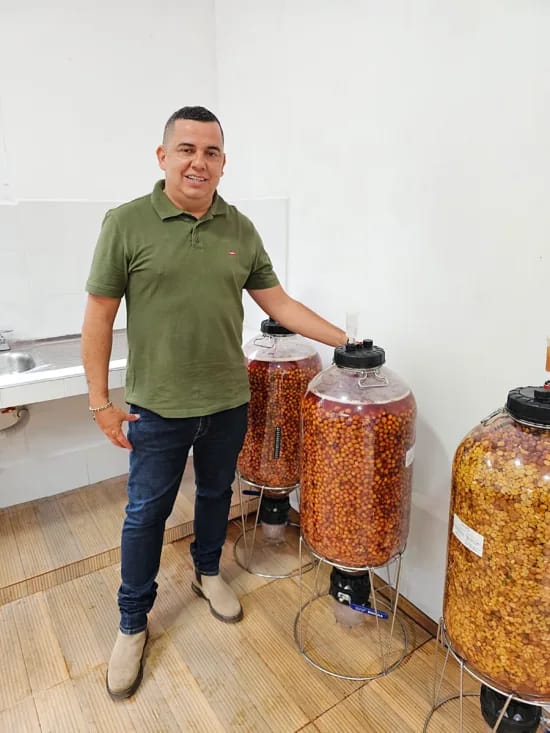[[{“value”:”
BY EDDIE P. GOMEZSPECIAL TO BARISTA MAGAZINE
Featured photo courtesy of Elkin Guzman
Elkin Guzman is an acclaimed coffee producer from Palestina, Huila, Colombia. Affable and down-to-earth, he is passionate about coffee and walks through life with a well-timed sense of humor. Along with his wife, Diana Devia, the 43-year-old university-trained agronomist oversees all facets of production at El Mirador, a farm that has been in his family for nearly 80 years.
Elkin is well-respected for the quality of the coffees produced on his farm, and his innovative work with post-harvest processing techniques in Colombia. Elkin is also known for his collaboration with Rodrigo Sanchez and Claudia Samboni, who are proprietors of Aromas del Sur, another highly regarded producer from Huila.
In the current issue of Barista Magazine, Elkin shares his knowledge of coffee with us as he offers readers a candid look into the life of a producer. He also brings readers up to date on his family’s background in coffee, his early days at El Mirador, and what it is like to welcome coffee buyers from around the world to his mountain-top farm. In this unpublished excerpt from the interview, Elkin reacts to some of the controversies surrounding the rising popularity of co-fermented coffees. Co-fermented coffees—which at El Mirador can be made by adding fruit to create unique flavors—are a highly debated topic that continues to rage as the specialty-coffee industry searches out its next transformative wave.
Barista Magazine: There has been some pushback against co-fermented coffees like the ones you produce. Critics argue that they pose challenges to long-held notions regarding how coffee is supposed to taste, that the process interferes with the terroir. What do you have to say in response, and what are your long-term predictions about these coffees?
Elkin Guzman: That is an interesting question. First, how did we get here? If people hadn’t asked for bolder flavors, we wouldn’t have produced them. We tried every model we could think of in order to produce that type of intensity—prolonged fermentation, double fermentation, mixed fermentation, water temperatures at 30 degrees and even 80-hour fermentations. We couldn’t do it. Rodrigo thought we could transfer those flavors to coffee by adding actual fruit during the fermentation process, borrowing principles from other industries. That is where co-fermented coffees were born—because clients asked for coffees that tasted more like strawberry or passion fruit or mango.
Only some of our coffees are co-fermented, but we do have a portfolio of them. We are very clear about letting our clients know that we achieve those flavors through adding fruit during fermentation. We don’t claim that we achieved those flavors through fermentation only because, as I just mentioned, we tried and tried and couldn’t do it. If our-co fermented coffees taste like peach, it’s because there are peaches added during the process.
A lot has happened with this debate, but the important thing for me was being at the forefront of this evolutionary process. I was in town this week talking to a store owner about some of Rodrigo’s co-fermented coffees. He tells me that clients come in and ask for the fermented coffees that taste like coconut lemonade or mojito because they tasted them and liked them. They want more. He explains the process to them. They understand it, or they don’t. In the end, it is the customer who decides if they like it or not.
It’s supply and demand. The fluctuations in the market have made some producers wealthy, but they have also broken a lot of them. What we are doing is putting new products out there in order to explore what the market decides. The problem is that we began to be stigmatized, so we’ve had to come out and defend ourselves.
We are clear about what goes into our coffees. There shouldn’t be any coffee gurus telling people how to drink their coffee. We are simply tapping into the evolutionary path which has seen us pass through naturally processed coffee, washed, honey, exotic, and experimental. If a customer wants natural, it’s there. If they want exotic, semi-washed, or experimental, they are there. If they want blends, decafs, or fermented ones, they are there. Now co-fermented coffees have arrived. We bring coffees to market for the individual specialty-coffee drinker who wants to enjoy a cup at home or in a shop.
ABOUT THE AUTHOR
Eddie P. Gomez (he/him) is a freelance writer based in Modesto, Calif. When he is not substitute teaching kindergarten classes, he wanders from city to city, perfecting the art of the food and coffee adventure.
Subscribe and More!
Out now: It’s the April + May 2024 issue of Barista Magazine! Read it for free with our digital edition. And for more than three years’ worth of issues, visit our digital edition archives here.
You can order a hard copy of the magazine through our online store here, or start a subscription for one year or two.
“}]]


